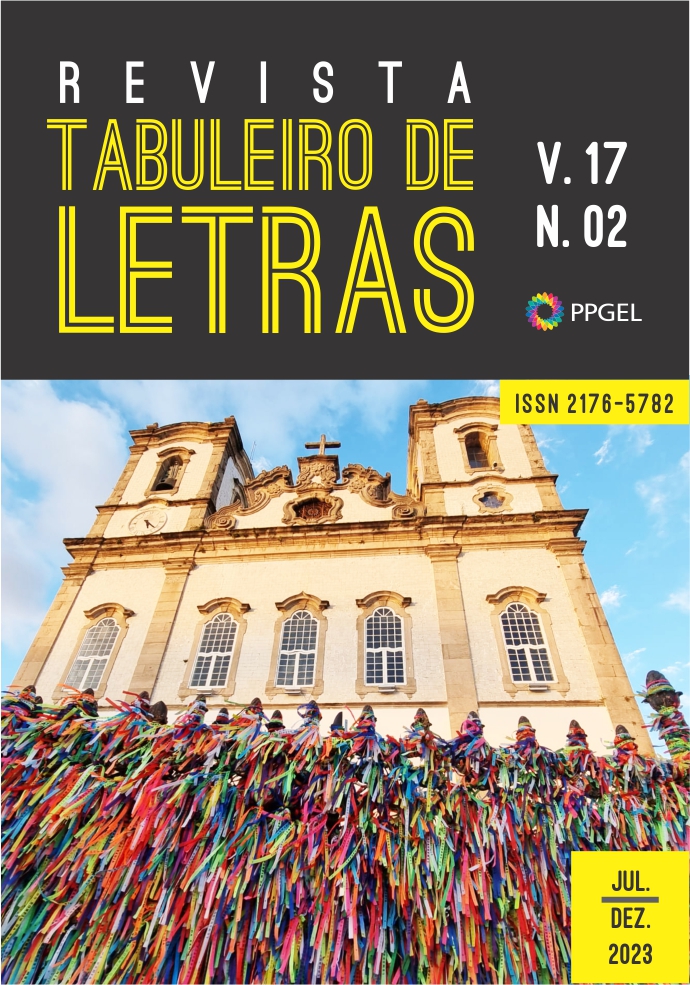Evãn, evoé!
a canção báquica de Cassandra em As Troianas de Eurípides
DOI:
https://doi.org/10.35499/tl.v17i2.17983Keywords:
Cassandra, Himeneu, Eurípedes, As TroianasAbstract
Kassandra, the discredited fortuneteller cursed by Apollo, sings a Bacchic song amid the mournful atmosphere of Trojan Women (c. 415 BC) by Euripides (c. 484 – 406 BC). This article presents an analysis of the representation of a nuptial song, a hymenaeus, in the tragedy Trojan Women by Euripides, sung by Priam's daughter, in the first Episode of the play. This is bibliographical research, whose objective is to analyze literary aspects of the solo song, a monodia, by Kassandra. For this, at first, the trajectory of the myth from the Homeric to the Classical period is recovered, starting with the translation of the original Greek text that makes up the song. In the second part of the article, musical aspects of the Euripidean opera are discussed and the form and content of the song presented by the character are examined. In this way, we will problematize the relations between the text format chosen by the poet and the meanings produced from his presence in a tragedy. It is pointed out as an initial hypothesis that the option for a festive poetic genre amid the predominant atmosphere of regret in the play is due to the characteristic insanity, mania, attributed to Cassandra. As a result of the investigation, a point of contact is recognized between the idea of marriage and the idea of death, as an element of self-characterization of the female character in Euripides.
Downloads
References
ANDERSON, M. J. The fall of Troy in early greek poetry and art. Oxford: Claredon Press, 1997.
BIEHL, W. Euripides Troades. Heidelberg: Carl Winter: Universitätsverlag, 1989.
BRADLEY, M. Z. O incêndio de Tróia. Tradução de Alfredo Barcellos PPinheiro. São Paulo: Imago, 1988.
BATTEZZATO, L. The new music of The Trojan Women. Lexis: Poetica,
retorica e comunicazzione nella tradizione classica, v. 23. Amsterdam, p. 73 -
CALAME, C. Greek Myth and Greek Religion. In: WOODART, R. The Cambridge Companion to Greek Mythology. Cambridge: Cambridge University Press, 2009.
CAMPOS, Haroldo de. Ilíada de Homero: vol. I e II. São Paulo: Benvirá, 2010.
COULANGES, Fustel de. A cidade antiga. Tradução de Fernando de Aguiar. São Paulo: Martins Fontes, 1992.
CSAPO, E. Later Euripidean drama. Illinois Classical Studies, v. 24, p. 399-426. Illinois, 1999.
______. The politics of the new music. In: MURRAY, Penelope; WILSON, Peter. Music and the muses: the culture of ‘mousike’ in classical Athenian city. New York: Oxford University Press, 2004.
DODDS, E. R. Os gregos e o irracional. Tradução Paulo Domenesh Eneto. São Paulo: Escuta, 2002.
EURÍPIDES. Troades. Edited with introduction and commentary by David Kovacs. New York: Oxford University Press, 2018.
EVELYN-WHITE, H. Hesiod, Homeric Hymns, Epic Cycle and Homerica.
Loeb Classical Library. Cambridge, Cambridge University Press, 1982.
FINGLASS, P. Pindar: Pythian eleven. Cambridge: Cambridge University
Press, 2007.
FRISK, H. Griechisches etymologistes wörterbuch. Heidelberg: Carl
Winter, Universitätsverlag, 1960.
HERINGTON, John. Poetry into drama: early tragedy and the greek poetic tradition. Berkeley: University of Califonia Press, 1985.
HESÍODO. Os trabalhos e os dias. Tradução de Alessandro Rolim de Moura.
Curitiba: Sugesta, 2012.
HOMERO. Odisseia. Tradução de Christian Werner. São Paulo: Cosac Naify,
KARAMANOU, I. Euripides, Alexandros. Berlin: De Grutyer, 2017.
LIDDEL, H.G.; SCOTT, R., JONES, S. Greek-English Lexicon with a revised
supplement. Oxford: Clarendon Press, 1992.
LOURENÇO, F. The lyric metres on Euripidean drama. Coimbra: Imprensa da Universidade de Coibra, 2010.
MAZZOLDI, Sabina. Cassandra, la vergine e l’indovina: Identitá di um
personaggio da Omero all’ Elenismo. Pisa: Instituto Editoriali e Poligrafici
Internazionali, 2001.
PAPADOPOULOU, T. Cassandra’s radiant vigour and the ironic optimism of Euripides Troades. Leiden: Brill. Mnemosyne, vol. LIII, fasc. 3. 2000.
REHM, Rush. Marriage to death: the conflation of wedding and funeral rituals in greek tragedy. Princeton: Princeton University Press, 1994.
RUTHERFORD, Ian. Pindar’s Paeans: Reading of the fragments with a survey of the genre. Oxford: Oxford Univeristy Press, 2001.
TSITONIS, E. C. Hymenaios und Epithalamion. Stuttgart: Teubner, 1990.
WERNER, Christian. As performances de Cassandra em Troianas de Eurípides. São Paulo: Faculdade de Filosofia, Letras e Ciências Humanas. Universidade de São Paulo. Letras Clássicas, n 6, p. 117 – 133. 2002.
WOLF, C. Cassandra. Tradução de Marijane Vieira Lisboa. São Paulo: Estação Liberdade, 2007.
Downloads
Published
How to Cite
Issue
Section
License
Autor(es) conservam os direitos de autor e concedem à Revista o direito de primeira publicação, com o trabalho simultaneamente licenciado sob a Licença Creative Commons Attribution que permite a partilha do trabalho com reconhecimento da autoria e publicação inicial nesta Revista.

















